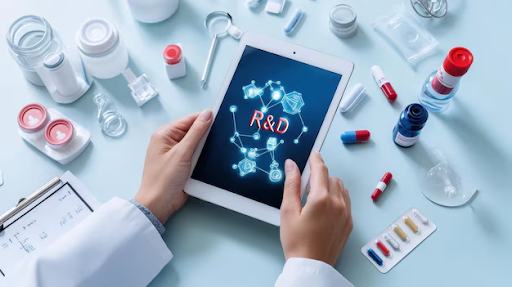ERP software, with its ability to integrate and automate processes, acts as the most optimal solution, helping pharmaceutical companies optimize operations, enhance efficiency, and meet the increasingly high demands of the market.
In this article, let's explore the key features that an effective ERP system in the pharmaceutical manufacturing industry needs to have.
Learn more in the article: Why is ERP important in the pharmaceutical industry?
1. Comprehensive supply chain management

From managing raw materials, monitoring the production process, to distributing products to consumers, ERP helps ensure the continuity and efficiency of the supply chain.
- Inventory tracking: Helps businesses always keep track of the quantity of goods in stock, expiration dates, and storage locations.
- Supplier management: Store detailed information about suppliers, transaction history, and quality assessments.
- Order management: Monitor the order placement, delivery, and payment process, ensuring goods arrive at the right place and on time.
- Demand forecasting: Based on historical data, the software helps forecast consumption demand to plan production and inventory procurement effectively.
2. Production management

Production management is one of the core features of ERP software in the pharmaceutical industry, playing a crucial role in optimizing production processes, ensuring product quality, and complying with the industry's strict regulations.
- Production planning: Based on historical sales data and market trends, ERP helps accurately forecast market demand, thereby creating an appropriate production plan.
- Material management: Managing the quantity and quality of input materials to ensure they meet production requirements.
- Quality management: Monitoring the production process, controlling product quality, ensuring compliance with GMP standards.
- Equipment maintenance management: Schedule regular maintenance for machinery and equipment and store information about the devices and maintenance history.
3. Financial management

The financial management feature in pharmaceutical ERP software plays a core role, helping businesses gain an overview and tightly control financial activities. The three main aspects of financial management include: accounting management, budget management, and debt management. Below is a detailed analysis of each aspect along with illustrative examples.
- Accounting management: Automating accounting tasks, generating financial reports quickly and accurately.
- Budget management: Budget planning, cost tracking, performance control.
- Debt management: Managing customer and supplier debts, minimizing the risk of bad debts.
For example, a pharmaceutical company uses ERP to manage production costs, including raw materials, labor, utilities... The system automatically calculates the product cost, compares it with the selling price to evaluate business efficiency. In addition, the system also helps the company monitor accounts receivable from customers and accounts payable to suppliers, ensuring a stable cash flow.
4. Sales management

Sales management helps businesses build sustainable relationships with customers, thereby increasing sales and profits.
- Customer management: Storing detailed information about customers, purchase history, analyzing customer behavior.
- Order management: Monitor the sales process, from order receipt to delivery and payment.
- Distribution channel management: Effectively manage distribution channels, evaluate the effectiveness of each channel.
The practical application is that the system will record detailed information about each hospital, including frequently imported products, quantities, prices, and payment history. When there is a new order, the system will automatically check the inventory, create an invoice, and send a notification to the warehouse department to dispatch the goods. At the same time, the system will also analyze sales data to offer appropriate promotions for each hospital, helping to increase sales and strengthen relationships.
5. Integration and reporting

The integration and reporting features are among the most important factors of ERP software, helping pharmaceutical companies effectively manage business operations, make accurate decisions, and enhance competitive advantage.
- Integrate other systems: Integrate with other systems such as CRM, HRM, to create a unified management system.
- Management reports: Provide a variety of management reports to help business leaders make accurate decisions.
6. Comply with regulations

This feature in the pharmaceutical ERP software is one of the core elements, ensuring that all business activities comply with the strict regulations of the pharmaceutical industry. This feature focuses on managing and controlling processes to ensure product quality, user safety, and compliance with legal requirements.
- Compliance with GMP (Good Manufacturing Practice): A set of regulations on good manufacturing practices, ensuring that pharmaceutical products are produced under hygienic, safe conditions and with stable quality.
- Compliance with GSP (Good Storage Practice): A set of regulations on good storage practices, ensuring that medicines are stored under appropriate conditions, avoiding damage, deterioration, and ensuring therapeutic efficacy.
7. Inventory management

Almost all ERP software provides basic inventory management features. However, a crucial consideration in the pharmaceutical industry is to choose the first expired, first out (FEFO) method as the primary inventory management approach. It ensures that products with the earliest expiration dates are dispatched first, thereby avoiding expired goods and ensuring user safety. That means you will definitely maintain high quality continuously and not endanger anyone's life by selling an expired medication.
8. Strict quality control management

Pharmaceutical ERP software provides the ability to track components throughout the production process from raw materials to finished products. Gain insight into the financial performance of every aspect of the business and monitor inventory to ensure efficient order fulfillment and timely delivery.
- Monitor the entire production process: From the stage of raw material input, through various production stages, until the finished product is ready for shipment.
- Quality control of each product batch: Each product batch is assigned a unique code, making it easy to trace information about the origin of raw materials, production processes, and testing results.
- Ensure compliance with standards: Pharmaceutical ERP supports businesses in complying with GMP (Good Manufacturing Practice), GSP (Good Storage Practice), GLP (Good Laboratory Practice), and other regulations in the pharmaceutical industry.
- Build a warning system: The system will automatically detect and alert any deviations or abnormalities in the production process, helping the business to address them promptly.
- Storing test data: All test results are stored in the system, creating a detailed history of product quality.
- Data analysis for improvement: ERP provides data analysis tools, helping businesses identify the causes of errors, thereby proposing measures to improve the production process.
9. Conclusion
In summary, pharmaceutical ERP software is an indispensable tool to help pharmaceutical companies effectively manage production and business activities and ensure product quality. With the ability to integrate processes, automate tasks, and provide detailed reports, ERP helps businesses enhance productivity, minimize risks, and make accurate business decisions. However, to choose a suitable ERP software, businesses need to carefully consider their scale, needs, and budget.
In the future, with the continuous development of technology, pharmaceutical ERP software will be upgraded and integrated with many new, smarter features to meet the ever-increasing demands of the pharmaceutical industry. The adoption and implementation of new technologies will help pharmaceutical companies maintain their competitive position in the market.